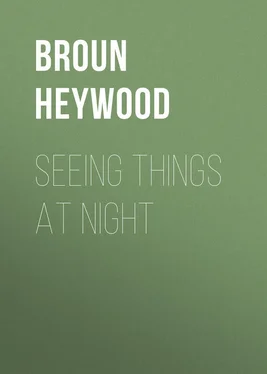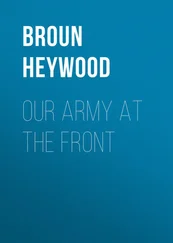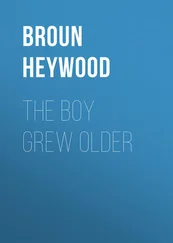Heywood Broun - Seeing Things at Night
Здесь есть возможность читать онлайн «Heywood Broun - Seeing Things at Night» — ознакомительный отрывок электронной книги совершенно бесплатно, а после прочтения отрывка купить полную версию. В некоторых случаях можно слушать аудио, скачать через торрент в формате fb2 и присутствует краткое содержание. ISBN: , Жанр: foreign_antique, foreign_prose, foreign_language, на английском языке. Описание произведения, (предисловие) а так же отзывы посетителей доступны на портале библиотеки ЛибКат.
- Название:Seeing Things at Night
- Автор:
- Жанр:
- Год:неизвестен
- ISBN:http://www.gutenberg.org/ebooks/35793
- Рейтинг книги:4 / 5. Голосов: 1
-
Избранное:Добавить в избранное
- Отзывы:
-
Ваша оценка:
- 80
- 1
- 2
- 3
- 4
- 5
Seeing Things at Night: краткое содержание, описание и аннотация
Предлагаем к чтению аннотацию, описание, краткое содержание или предисловие (зависит от того, что написал сам автор книги «Seeing Things at Night»). Если вы не нашли необходимую информацию о книге — напишите в комментариях, мы постараемся отыскать её.
Seeing Things at Night — читать онлайн ознакомительный отрывок
Ниже представлен текст книги, разбитый по страницам. Система сохранения места последней прочитанной страницы, позволяет с удобством читать онлайн бесплатно книгу «Seeing Things at Night», без необходимости каждый раз заново искать на чём Вы остановились. Поставьте закладку, и сможете в любой момент перейти на страницу, на которой закончили чтение.
Интервал:
Закладка:
Our suggestion is that whatever deep wrong Yale once committed against Harvard, a process of diminution of feeling should be allowed to set in. After all, can't the men of Cambridge be broadminded about these things and remember that nothing within the power of Yale could possibly hurt Harvard very much? Even in the days when the blue elevens were winning with great regularity there should have been consolation enough in the thought that Harvard's Greek department still held the edge. Seemingly nobody ever thought of that. In the 1906 game a Harvard half-back named Nichols was sent in late in the game while the score was still a tie. On practically the first play he dropped a punt which led directly to a Yale touchdown and victory.
Throughout the rest of his university career he was known in college as "the man who dropped the punt." When his brother entered Harvard two years later he was promptly christened, and known for his next four years, as "the brother of the man who dropped the punt."
Isn't this a little excessive? It seems so to us, but the emphasis has not yet shifted. Only a month or so ago we were talking in New Haven before an organization of Yale graduates upon a subject so unpartisan as the American drama – though to be sure Harvard has turned out ten playwrights of note to every one from Yale – and somehow or other the talk drifted around to football. In pleading for less intensity of football feeling we mentioned the man who dropped the punt and his brother and told how Yale had recovered the fatal fumble on Harvard's nineteen-yard line. Then, with the intention of being jocose, we remarked, "The Yale eleven with characteristic bulldog grit and courage carried the ball over the line." To our horror and amazement the audience immediately broke into applause and long cheers.
Some of my best friends are Yale men and there is no basis for the common Harvard assumption that graduates of New Haven's leading university are of necessity inferior to the breed of Cambridge. Still, there is, perhaps, just a shade of difference in the keenness of perception for wit. Practically all the Harvard anecdotes about Yale which we know are pointed and sprightly, while Yale is content with such inferior and tasteless jibes as the falsetto imitation which begins "Fiercely fellows, sift through." Even the audience of graduates to which we referred was singularly cold to the anecdote about the difference in traditions which prevails at New Haven and at Cambridge. "When a Yale man is sick, the authorities immediately assume that he is drunk. When a Harvard man is drunk, the authorities assume that he is sick."
Nor were we successful in retelling the stirring appeal of a well-known organizer who was seeking to consolidate various alumni bodies into a vast unified employment agency for college men. "There should be," he cried, "one great clearing house. Then when somebody came for a man to tutor his children we could send him a Harvard man and if he needed somebody to help with the furnace, we'd have a Yale graduate for him."
Joking with undergraduates we found still more disastrous. After the last Harvard-Yale football game – score Harvard 9, Yale 0, which doesn't begin to indicate the margin of superiority of the winning team – we wrote an article of humorous intent for a New York newspaper. Naturally our job as a reporter prevented us from being partisan in our account of the game. Accordingly, in a temperate and fairminded spirit, we set down the fact that, through the connivance of the New York press, Yale has become a professional underdog and that any Harvard victory in which the score is less than forty-two to nothing is promptly hailed as a moral victory for Yale.
Developing this news angle for a few paragraphs, we eventually came to the unfortunate fist fight between Kempton of Yale and Gaston of Harvard which led to both men being put out of the game. It was our bad luck to see nothing but the last half second of the encounter. As a truthful reporter we made this admission but naturally went on to add, "Of course, we assume that Kempton started it." For weeks we continued to receive letters from Yale undergraduates beginning, "My attention has been called to your article" and continuing to ask with great violence how a reporter could possibly tell who started a fight without seeing the beginning of it. Some letters of like import were from Princeton men.
Princeton is always quick to rally to the defense of Yale against Harvard. This suggests a possibly common meeting ground for Harvard and Yale. Of course, they can hardly meet on the basis of a common language for the speech of Yale is quite alien. For instance, they call their "yard" a "campus." Also, there are obvious reasons why they cannot meet as equal members in the fellowship of educated men. Since this is a nonpartisan article designed to promote good feeling it will probably be just as well not to go into this. Though football is the chief interest at New Haven, Yale men often display a surprising sensitiveness to attacks on the scholarship of their local archaeologists. Nor will religion do as a unifier. Yale is evangelical and prays between the halves, while Harvard is mostly agnostic, if it isn't Unitarian. No, just one great cause can be discovered in which Harvard men and Yale men can stand shoulder to shoulder and lift their voices in a common cause. Each year some public spirited citizen ought to hire Madison Square Garden and turn it over to all graduates and undergraduates of Harvard and of Yale for a great get-together meeting in which past differences should be forgotten in one deep and full throated shout of "To Hell with Princeton!"
Bacillus and Circumstance
IT is evening in the home of Peter J. Cottontail. The scene is a conventional parlor of a rabbit family of the upper middle class. About the room there is the sort of furniture a well-to-do rabbit would have, and on the shelves the books you would naturally expect. Leaves of Grass is there, of course; possibly Cabbages and Kings , and perhaps a volume or two of The Winning of the West , with a congratulatory inscription from the author. The walls have one or two good prints of hunting scenes and an excellent lithographic likeness of Thomas Malthus, but most of the space is given over to photographs of the family.
In the center of the room is a small square table, the surface of which is covered with figures ranged in curious patterns such as 2 × 5 = 10, and even so radical an arrangement as 7 × 8 = 56. At the rise of the curtain Peter J. Cottontail is discovered seated in an easy chair reading the current edition of The New York Evening Post . He is middle-aged and wears somewhat ill fitting brown fur, tinged with gray, and horn-rimmed spectacles. He looks a little like Lloyd George. As a matter of fact, his grandfather was Welsh. The actor should convey to the audience by means of pantomime that he has made more than a thousand dollars that afternoon by selling Amalgamated Cabbage short, and that there will be a tidy surplus for himself even after he has fulfilled his promise to make up the deficit incurred by the charity hop of the Bone Dry Prohibition Union. Now and again he smiles and pats his stomach complacently. It is essential that the actor should indicate beyond the peradventure of a doubt that Peter J. Cottontail has never touched spirituous or malt liquors or anything containing more than two per cent of alcohol per fluid ounce.
As P. J. Cottontail peruses his paper the ceiling of the room is suddenly plucked aside and two hands are thrust into the parlor. One of the hands seizes Mr. Cottontail, and the other hand, which holds a hypodermic needle, stabs the helpless householder and injects into his veins the contents of the needle. It is a fluid gray and forbidding. There is no sound unless the actor who plays Cottontail chooses to squeak just once.
Читать дальшеИнтервал:
Закладка:
Похожие книги на «Seeing Things at Night»
Представляем Вашему вниманию похожие книги на «Seeing Things at Night» списком для выбора. Мы отобрали схожую по названию и смыслу литературу в надежде предоставить читателям больше вариантов отыскать новые, интересные, ещё непрочитанные произведения.
Обсуждение, отзывы о книге «Seeing Things at Night» и просто собственные мнения читателей. Оставьте ваши комментарии, напишите, что Вы думаете о произведении, его смысле или главных героях. Укажите что конкретно понравилось, а что нет, и почему Вы так считаете.












